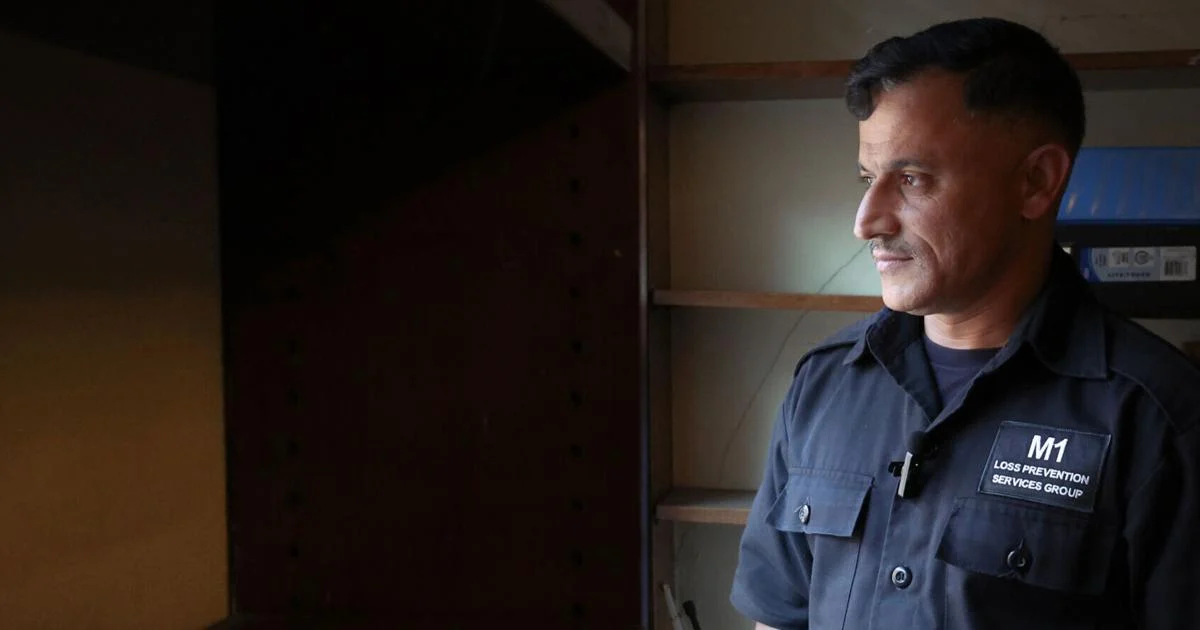
Mulakhil rushed out the back door of his house in Afghanistan on Aug. 14, 2021, as his country was on the brink of collapse. He heard his wife sobbing. His two-year-old son called out, “Papa, papa.”
“I didn’t have the chance to say goodbye to my son,” Mulakhil said. “It’s a day I will never forget.”
One day later, the Taliban captured the capital city of Kabul, marking the fall of Afghanistan to Taliban rule.
Durani spent 12 years in the Afghan Air Force fighting the Taliban. He now lives in Milwaukee, but has been separated from his wife and children for four years.
Mulakhil said his life was at risk, so his supervisor from the Afghan Army helped him get into the Kabul airport to escape on one of the planes as thousands of people crowded the gates. He wishes he didn’t have to leave his family behind, but he expected to be able to reunite with them soon.
But more than four years later, Mulakhil is living alone in California, still without his wife and three sons. His twin boys are now five, and his eldest son is 6. He has been separated from them for most of their young lives.
“It’s been four years,” Mulakhil said. “You are separated … from your family, from your children, and children from their parents. It’s so difficult, and it’s not fair.”
“I miss them,” he said. “They’re my kids.”
Donald Trump headshot
Mulakhil’s family and thousands of other Afghan families are stuck abroad due to problems with the United States’ reunification process. The process was sluggish under President Joe Biden and has been effectively shut down by President Donald Trump’s June travel ban and other immigration restrictions.
“There’s no open door for any of these folks,” #AfghanEvac founder and president Shawn VanDiver said. “There was an open door, and it was really slow. It was like a … slow, broken turnstile that sometimes got shut off for no reason. And then President Trump blew up that turnstile like it doesn’t exist anymore.”
The Lee Enterprises Public Service Journalism Team spoke with four Afghan immigrants living in Wisconsin, Pennsylvania and California who haven’t seen their immediate families since August 2021. They are confused about how to bring their families to the U.S., which is allowed under immigration laws but hindered by Trump’s new rules.
They each asked to be identified by either their first or last name only because they worked with or alongside the U.S. government, which makes them Taliban targets.
Durani, an Afghan immigrant living in Milwaukee, faced Taliban rocket launchers, grenades and machine gun attacks while defending an Afghan Air Force base in Kabul. He was the base’s deputy commander. He spent 12 years fighting the Taliban alongside U.S. troops.
“If I am forced to return to my country, I am certain the Taliban will find me, torture me and eventually kill me,” Durani wrote in his asylum application to stay in the U.S. “There is nowhere in my country that the Taliban can’t reach me.”
Durani hopes to bring his wife and four young children to Wisconsin for their safety. They, too, have been stuck abroad due to the travel ban and slow family reunification process.
“I don’t want to live alone my whole life, far away from them,” he said.
‘Slow, broken turnstile’
Nearly 200,000 Afghans have come to the U.S. since August 2021. They’ve resettled across the country, with large populations of Afghan immigrants in California, Texas, Virginia and Washington.
But less than a third of separated Afghan families have been reunited, according to Department of State data that identifies Afghans who are overseas awaiting family reunification.
About 6,000 Afghans who were abroad have successfully reunited with their families in the U.S. since 2021, while 16,000 individuals remain separated, according to a May 2025 U.S. Department of State report obtained by nonprofit organization #AfghanEvac. About 3,000 of the Afghans still abroad have unaccompanied minor children in the U.S.
“That’s a full-scale failure,” VanDiver said. “The Biden administration fully failed at that. I will acknowledge that people worked hard on it. They didn’t work hard enough.”
Jessica Bradley Rushing, #AfghanEvac spokesperson, used to work in the U.S. Department of State’s office of Coordinator for Afghan Relocation Efforts, or CARE, which led the family reunification efforts.
The sheer volume of cases and bureaucratic hurdles prevented family reunification cases from moving forward quickly, Bradley Rushing said. Challenges included limited staff, interagency issues, delays in launching a new immigration form, oversights that caused that form to expire and the complexity of most reunification cases.
“This deserved more attention and more urgency early on,” Bradley Rushing said. “And the urgency that was eventually applied to it was phenomenal, but it was two years after the withdrawal had happened.”
Most of the family reunifications that happened were in the fiscal year from October 2023 to September 2024. Cases picked up in June 2024, moving from “a trickle” to a steady stream, Bradley Rushing said. But months later, Trump took office and started closing the reunification pathways.
Doors closed
Afghan evacuees need to establish their own legal immigration status before petitioning to have their immediate family join them. The three main immigration pathways for Afghans are: filing for asylum in the U.S., getting classified as a refugee while abroad or obtaining a Special Immigrant Visa (SIV).
All three are legal immigration statuses that can lead to a U.S. green card. That immigration protection extends to immediate family members. Grantees of any of the three statuses are allowed to have their spouses and unmarried children under age 21 join them in the U.S. if they file the proper paperwork.
But Trump’s recent orders stop family reunification for two of the three Afghan immigration statuses.
Trump filed an executive order in January that bans all refugee admissions to the U.S., which prevents Afghans with refugee status from bringing their families here. And Trump included Afghanistan in the administration’s June travel ban, preventing family reunification for Afghans who have been granted asylum.
The Trump administration included an exception in the travel ban for Afghans with Special Immigrant Visas. The SIV program was created to protect Afghan allies who faced threats due to their work supporting U.S. troops. To be eligible, Afghans must have been paid directly by the U.S. government. The visa allows those Afghans and their families to get green cards and eventually apply to become U.S. citizens.
Bradley Rushing said the SIV exception extends to family members stuck abroad but is “functionally useless” because so few can afford to travel to multiple countries and jump through all of the hoops to finish their immigration processing alone.
Before coming to the U.S., Afghan families need to complete interviews at a U.S. embassy, but the embassy in Afghanistan closed.
Most go to nearby Pakistan, but it’s expensive to get a visa to travel there and maintain it, according to #AfghanEvac. Many families have let their visas expire and are living undocumented in Pakistan as the country conducts mass deportations of Afghans, sending tens of thousands back to Taliban rule.
Another challenge is that separated wives need to find a male chaperone to escort them out of Afghanistan due to the Taliban’s rules restricting women’s rights.
These are the sorts of obstacles that the CARE office was helping Afghan families navigate, Bradley Rushing said, but the Trump administration shuttered that office in July.
“Family reunifications have, by and large, been stopped with very, very, very few exceptions,” Bradley Rushing said. “And the exceptions would be people who are wealthy enough or connected enough to be able to get themselves out of Afghanistan to a third country, finish their SIV processing, and then get themselves to the United States and sustain themselves.”
Zahra is an SIV holder living in Fremont, California. She was a cook for the U.S. and Afghan militaries. She asked to be identified by her first name only for her and her family’s safety.
Zahra now works at a bakery and is struggling to afford rent, let alone the legal help she would need for her family reunification case.
She said she’s confused about how to get her husband, their two daughters and three sons out of Afghanistan and to the U.S. She has tried contacting lawyers who help Afghans with their immigration cases for free, but she hasn’t heard back from them.
“I don’t know how to send my voice to the government of the U.S. to help me, especially my children,” Zahra said. “Every night when I sleep, my son … he’s five years old. He’s calling me and crying on the other side of the phone.
“All the time I am crying. I have so much depression. Please, please help me.”
Many Afghans risked their lives
Listen now and subscribe: Apple Podcasts | Spotify | RSS Feed | SoundStack | All Of Our Podcasts
Trump has signaled that he does want to help Afghan evacuees.
Trump posted on Truth Social July 20 that he would “try to save” a group of Afghans in the United Arab Emirates who faced being deported back to Taliban rule. And on July 30, Trump said during a White House event that he would help Afghan allies, according to the Military Times.
“We’re going to take care of those people, the ones that did a job (for us), the ones that were told certain things,” Trump said in response to a question about Afghan refugees.
And the SIV exception in the travel ban seems to indicate that Trump wants to keep the U.S.’s doors open for at least some Afghans who helped the U.S.
VanDiver said it’s “arbitrary” that Trump would exempt Afghan SIV holders from the travel ban but continue to bar Afghan refugees and asylees from entry. He said there are many refugees and asylees who put their lives on the line for the U.S., but don’t qualify for an SIV because their paycheck didn’t technically come from the U.S. government.
Durani is one of them. His salary was paid by the Afghanistan government, so he is not eligible for an SIV. Instead, he has asylum. And his family, therefore, is banned from traveling to the U.S.
“There is no difference between asylum and SIV,” Durani said. “Yes, maybe the SIVs worked directly for the Americans, but we worked with the Americans.”
Mulakhil said he applied for an SIV, but he didn’t get approved. He’s not sure why.
The U.S. has strict limits on the number of SIVs that can be issued. As of June 2024, there were only 16,000 visas still available for more than 130,000 applicants, according to a report to Congress.
Without an SIV, Mulakhil’s family cannot enter the U.S., even though Mulakhil risked his life while working with U.S. troops. Mulakhil has asylum.
Mulakhil worked as a financial officer in a U.S.-backed special unit of the Afghan Army. His unit faced bombs and missiles alongside U.S. forces while going after the Taliban, Al-Qaeda and other terrorist groups.
Some members of Mulakhil’s unit were targeted and killed while off duty. He worried he, too, could be targeted at home.
“It’s very dangerous,” he said.
Durani is no stranger to threats at home. After he left Afghanistan, he said the Taliban came to his house looking for him. He said they threatened his father and harassed his wife and children, so they fled to Pakistan.
He said his brother, who worked for the Afghan Ministry of Defense, was left unconscious for two days after a Taliban car bomb exploded beneath him as he drove to work.
Durani said that easily could have been him. He and his brother lived in the same home. And Durani’s high-ranking position made him well-known to the Taliban. Durani said he had to leave for work at different times each day to avoid being targeted.
Mike Kershow, an immigration attorney with Keler Kershow PLLC in Washington, D.C., said it seems “particularly inhumane” to keep those who risked their lives in the military separated from their families.
“It’s hard to see any real distinction between the level of loyalty that the U.S. ought to show to an SIV as compared to a member of the Afghan military,” Kershow said.
Hasan has been separated from his wife since he fled Afghanistan four years ago to find refuge in Pennsylvania. He said it’s “taken a toll” on his mental health.
Kershow noted that asylees appear to have a legal right to reunite with their families. The U.S. asylum statute states that the persecuted person who is granted asylum can have their immediate family join them. Their family is then granted the same immigration status. The travel ban “basically undermines the entire statute,” Kershow said.
Hasan, an Afghan immigrant living in Pennsylvania without his wife, was granted asylum because he fears the Taliban would kill him if he returned to Afghanistan.
He wasn’t a soldier, but he worked on IT projects for the U.S. Embassy and the Afghan government. Hasan said that’s enough to put him in danger of Taliban retaliation. He is also part of the Hazara ethnic group, a minority that has been persecuted by the Taliban.
“Taliban are against our people. They don’t care about our people,” Hasan said. “They easily kill our people without any hesitation.”
Stuck abroad
Hasan’s wife is stuck in Afghanistan under Taliban rule. She is unable to work, further her education or leave her home without a male guardian.
“She’s alive,” Hasan said. “It’s not living.”
Hasan is trying to get her embassy interview scheduled, but has faced hurdles. Her case was assigned to Qatar, but he couldn’t get her a visa to travel there, so he got his local congressman to help him transfer it to Saudi Arabia. But now, a new rule means he likely needs to get her case transferred again, this time to Pakistan.
“They make everything so complicated,” Hasan said.
Durani’s family is living temporarily in Pakistan as they await their embassy interview. Durani said his children are scared to go to the park because they don’t want to get deported back to Afghanistan, where they would be unsafe.
Hasan and Durani emphasized that their family reunification cases have been approved by the U.S. government.
The embassy interview is usually a perfunctory step to confirm family members’ identities and make sure they don’t have communicable diseases, Kershow said. But since the travel ban was enacted in June, families are getting denied during the interviews.
Mulakhi’s wife and three sons had their embassy interview in Pakistan on Sept. 12. They got a letter the same day denying their request to enter the U.S. It cites Trump’s travel ban as the reason.
The letter also states that a “national interest exception” will not be granted in their case.
Kershow said many Afghan families have been getting similar letters. One of his clients, an Afghan soldier whose family is stuck in Pakistan, got one in July.
Kershow sent a letter to the embassy trying to argue that his client should be granted an exception because it is “extremely important, from a national interest perspective, for the U.S. not to abandon those who fought alongside the U.S. in this war against this terrorist government.” He hasn’t heard back on the request.
The travel ban states that exceptions can be made for people whose travel to America would serve a U.S. “national interest.” But it’s unclear what, if anything, would fall under that exception. The only exception Kershow has heard of was for a Venezuelan Little League team to enter the U.S. for playoffs.
Plea to Trump
Kershow said Trump wouldn’t have to take any formal action to allow Afghans into the U.S. Trump could simply make it clear that Afghans fall under the national interest exception that’s already included in the travel ban language.
The Trump administration could also create a comprehensive exception to the travel ban for Afghan asylees or restart refugee admissions. Kershow hopes Trump will at least exempt former members of the Afghan military from the travel ban.
“We’re just hoping that a little bit of sanity and sort of general humanity surfaces at some point to make this particular issue less of a humanitarian catastrophe than it has been so far,” Kershow said.
VanDiver and Bradley Rushing are hopeful that Trump might help Afghan evacuees. They said the policies that have negatively impacted Afghans might just be an oversight.
“I don’t necessarily think the President is the one driving these decisions specifically pertaining to Afghans,” Bradley Rushing said. “When he is given information about what the reality is for Afghans and how upset veterans’ groups are about it, he tends to say at least that he is in support of the things that we would hope to see happen.”
Despite being separated from his family, Durani is grateful to Trump and the U.S. government. He said, “they help me with everything,” and have been “so kind.”
Durani currently works as a security guard for a local grocery store. He said keeping people safe and free is important to him. He wants to earn his green card so he can join the U.S. Army to continue that mission.
Asked what he would say to Trump if he had an audience, Durani said, “I respect Mr. President too much.” Pressed further, Durani said he would “kindly request” that his family’s case be treated like an SIV case.
“I want to join with my family,” Durani said. “That is my dream.”
Get Government & Politics updates in your inbox!
Stay up-to-date on the latest in local and national government and political topics with our newsletter.
* I understand and agree that registration on or use of this site constitutes agreement to its user agreement and privacy policy.



